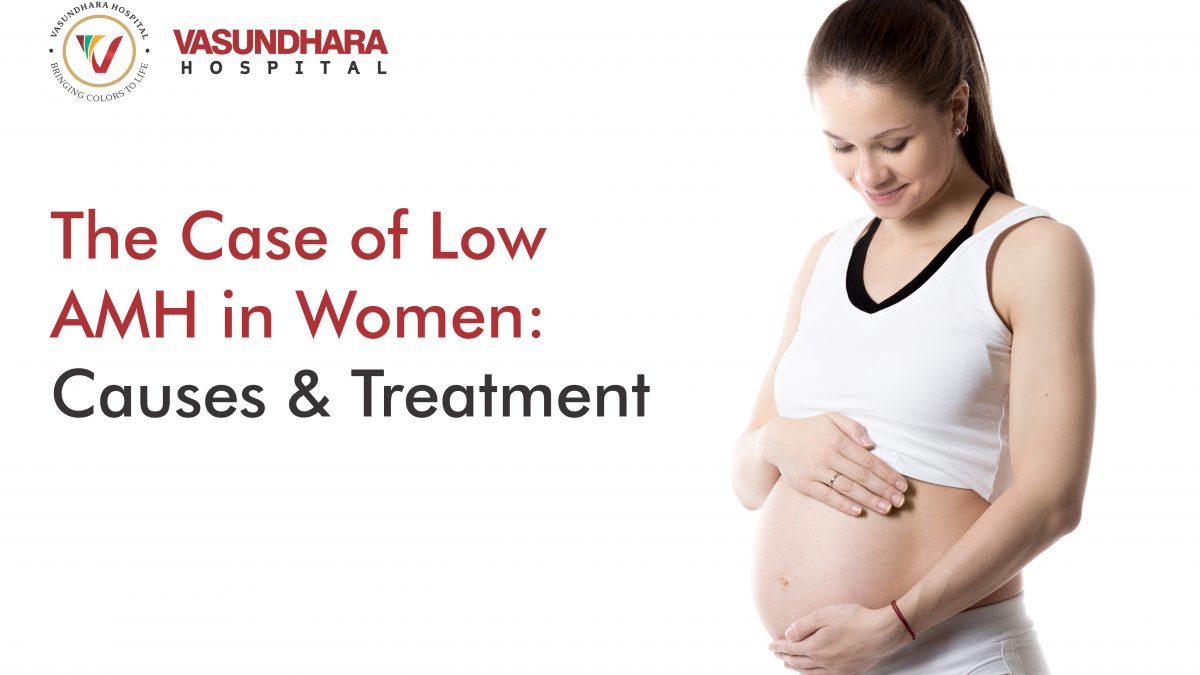The Case of Low AMH in Women: Causes & Treatment

ICSI with TESA: A Ray of Hope for Infertile Couples
October 26, 2021
Gynaecology Endoscopic Surgery: A Technological Boon in Obstetrics and Gynecology
November 28, 2021What is AMH?
AMH stands for Anti-MüllerianHormone. It is glycoprotein hormone that is secreted by the pre antral follicles and small antral follicles of the ovary that helps in their growth and differentiation. By the time a woman attains puberty, her body has about 100,000 oocytes which gradually decreases to less than 10,000 eggs by the time she attains the age of 40. The number of eggs in her body reduces to zero as she reaches her menopause.
The egg reserve of a woman is tested using AMH. It basically defines a woman’s potential of getting pregnant. Unlike the other tests of ovarian reserve, like FSH (Follicle-stimulating Hormone) which is done on a specific day of the period, say Day 1 or 2; the AMH can be tested on any day of the menstrual cycle.
The AMH level between 1-3.5 ng/mL is considered as normal. Any AMH level below 1 ng/mL is low and above 2 ng/mL is considered a good value. Further, any level below 0.3 ng/mL is considered as very low. The AMH level generally reduces with age. AMH level greater than 3.5 ng/mL is found amongst younger women and that of less than 1 ng/mL is found among women of age 40 years and more. Generally, women with polycystic ovaries have AMH level more than 3.5 ng/ml.
What are the Causes of Low AMH?
There can be multiple causes of low AMH, such as:
- Age
- Endometriosis
- Genetic factors
- Auto-immune Diseases
- Cancer Treatment
Apart from these, factors such as excessive smoking, obesity and environmental causes such as pollution may also result in low AMH in women. Further, in women taking birth control pills and the ones who have received Lupron injections false low AMH level may be shown.
What is the Treatment of Low AMH?
Although there is no specific treatment of low AMH, yet by improving the life style and taking vitamins and supplements, the pregnancy outcomes can be improved.
Women suffering from low AMH should have proper nutritious diet, which is low in calories and high in protein. Their diet should contain more fresh fruits and vegetables. Adequate exercise (at least 40 minutes a day) and relaxation techniques, such as yoga must be followed. Smoking and alcohol should be a completely avoided.
Apart from the above life style changes, Vitamin-D, Folic acid, Co-enzyme Q 10 and fish oil supplementation can also show better results in women having low AMH. Moreover, testosterone supplementation and DHEA (Dehydroepiandrosterone) are also associated with better responses.
What is most important to note here is that the decision regarding “Which method of treatment is to be adopted?” should be extensively discussed. All the options, say the natural method, IVF (In-virto Fertilization), IUI (Intra-Uterine Insemination), Surrogacy, Donor eggs and adoption should be discussed well with the patient. Generally in case where a woman has low AMH and desires to conceive, IVF is the most suitable.
Here it is also important not to ignore the male partner. Good diet, regular exercise and avoiding smoking and alcohol on the part of the male partner are also important.
Intra ovarian platelet rich plasma infusion, mitochondrial transfer, stem cell transfer and ovarian transplantation are some of the experimental ways of treating women with low AMH. However, these methods cannot be routinely tried on patients as they are still experimental. Finally it is important for you to know that having a low AMH does not mean that you cannot get pregnant. Multiple cycles of stimulation may lead to better egg count in subsequent cycles. Antagonists and long protocol work equally well. Embryo pooling can also prove to be helpful. However, it is important to know when to stop treatment and/or go ahead with other options like egg donation or adoption.
In case you have any low AMH related queries, feel free to contact our experts at Vasundhara Hospital.
Medically Reviewed By:

(M.B.B.S., M.S., FICOG & FIAGES)
Chief Medical Director Sr. Endoscopic Surgeon & A.R.T. Specialist
Dr. Sanjay Makwana having more than 25 years of enriching experience in the field of Infertility, training exposure from Genk, Belgium, Germany, Italy. One of the Best & Most Senior Infertility Specialist heading the department of Assisted Reproductive Technology and has set a benchmark for Best IVF Clinic & Infertility Management in Rajasthan. He has been felicitated with various awards and recognition’s in the field of Infertility.


